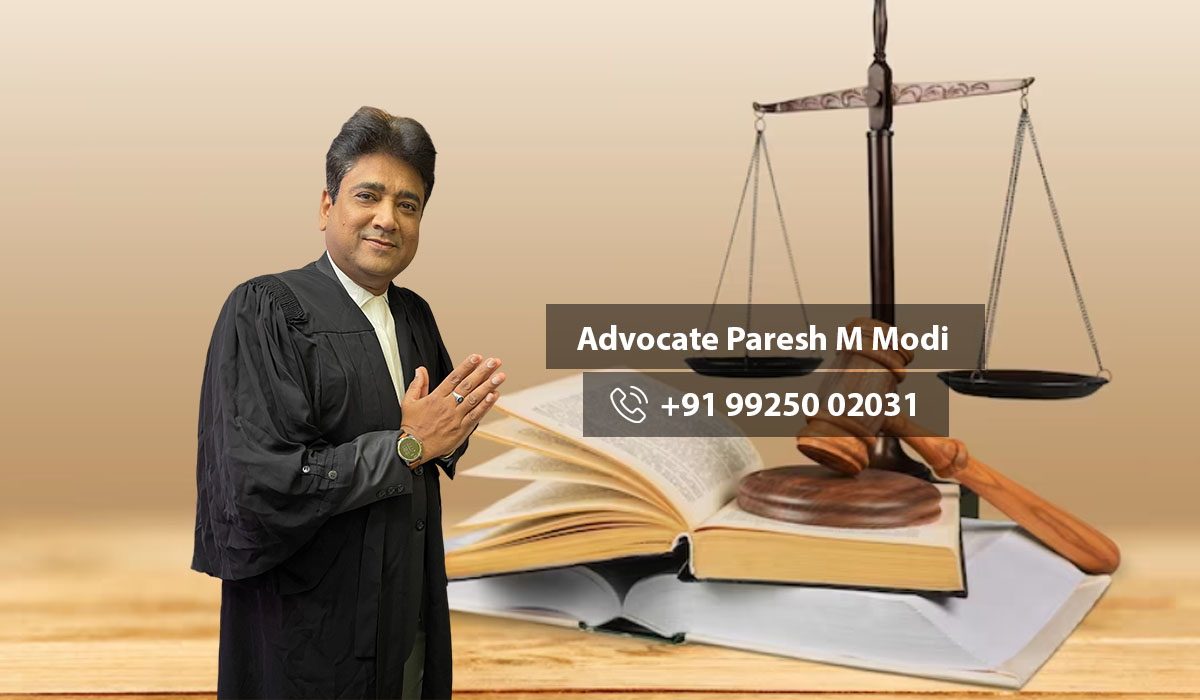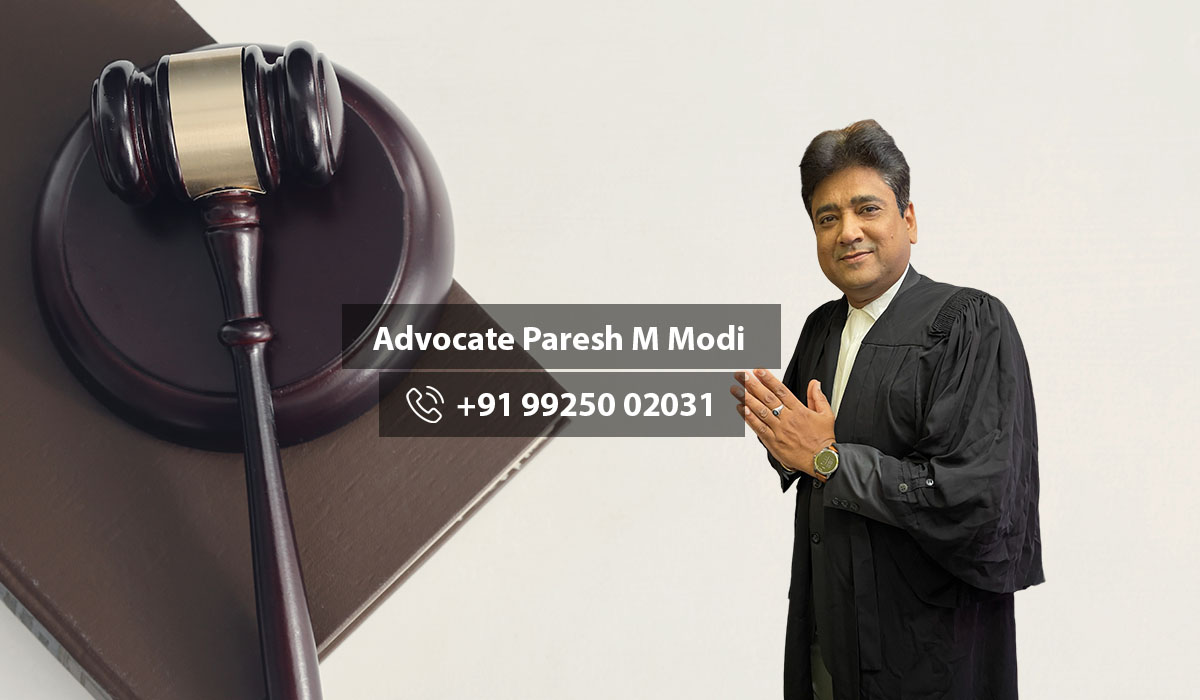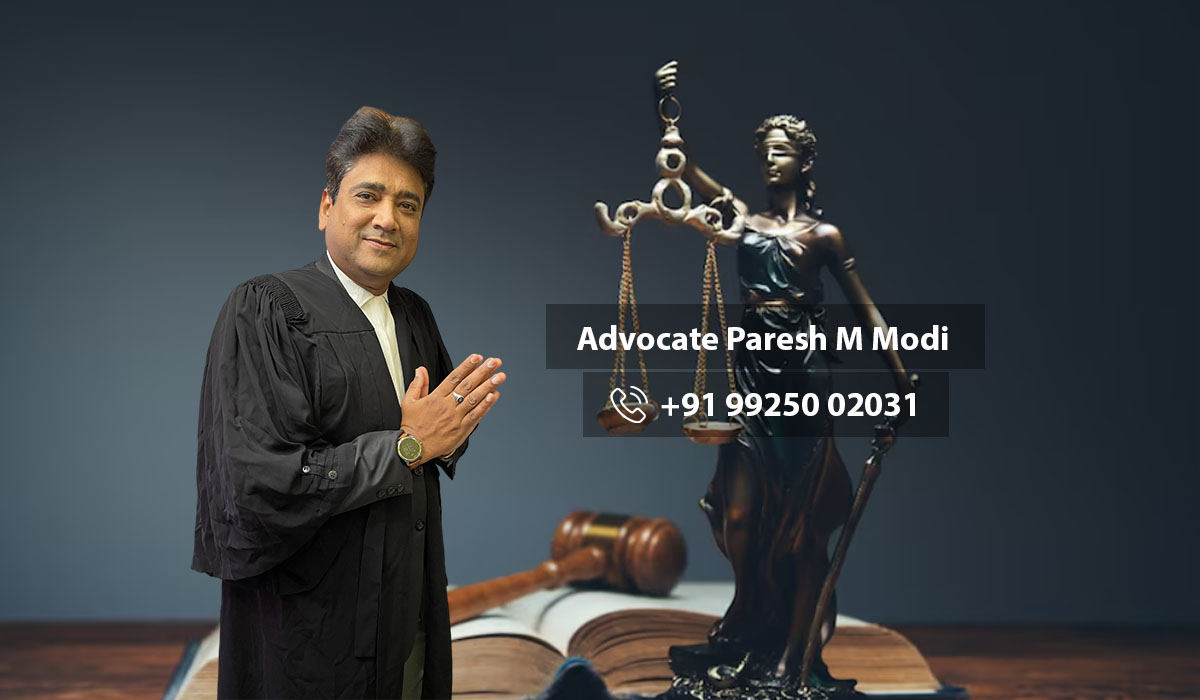Bail Specialist Advocates in Ahmedabad Gujarat| 9925002031 | Criminal Advocate in Ahmedabad | Advocate Paresh M Modi
Arnesh Kumar VS State of Bihar | Guidelines on Arresting the person | Arneshkumar Judgment
IPC 1860 કલમ 498-A દહેજ પ્રતિબંધ અધિનિયમ, 1961ની કલમ 4 સાથે વાચતાં, વ્યક્તિની ધરપકડ કરવા માટેની માર્ગદર્શિકા
અર્નેશ કુમાર વિ. બિહાર રાજ્ય જજમેંટ – વ્યક્તિની ધરપકડ અંગે માર્ગદર્શિકા
ધરપકડ સામે રક્ષણ સંબંધિત જોગવાઈઓ પર ચર્ચા કર્યા પછી, કોર્ટે ધરપકડમાં અનુસરવા માટેની માર્ગદર્શિકા નિર્ધારિત કરી. ઓનરેબલ સુપ્રીમ કોર્ટે નિર્દેશ આપ્યો-
1) તમામ રાજ્ય સરકારો તેના પોલીસ અધિકારીઓને સૂચના આપે કે જ્યારે IPCની કલમ 498-A હેઠળ કેસ નોંધવામાં આવે ત્યારે આપમેળે ધરપકડ ન કરવી, પરંતુ કલમ 41, CrPC માંથી વહેતા ઉપરોક્ત માપદંડો હેઠળ ધરપકડની જરૂરિયાત વિશે પોતાને સંતોષવા
2) તમામ પોલીસ અધિકારીઓને કલમ 41(1)(b)(ii) હેઠળ ઉલ્લેખિત પેટા કલમો ધરાવતી ચેક લિસ્ટ પ્રદાન કરવામાં આવે; પોલીસ અધિકારીએ આરોપીને વધુ અટકાયત માટે મેજિસ્ટ્રેટ સમક્ષ ફોરવર્ડ/રજૂ કરતી વખતે, યોગ્ય રીતે ફાઇલ કરેલ ચેક લિસ્ટ ફોરવર્ડ કરશે અને ધરપકડની આવશ્યકતા ધરાવતા કારણો અને સામગ્રી રજૂ કરશે;
3) આરોપીની અટકાયતને અધિકૃત કરતી વખતે મેજિસ્ટ્રેટ ઉપરોક્ત શરતોમાં પોલીસ અધિકારી દ્વારા આપવામાં આવેલ અહેવાલનો અભ્યાસ કરશે અને તેનો સંતોષ નોંધ્યા પછી જ, મેજિસ્ટ્રેટ અટકાયતને અધિકૃત કરશે;
4) આરોપીની ધરપકડ ન કરવાનો નિર્ણય, કેસની સંસ્થાની તારીખથી બે અઠવાડિયાની અંદર મેજિસ્ટ્રેટને એક નકલ સાથે મેજિસ્ટ્રેટને મોકલવામાં આવશે, જે લેખિતમાં નોંધવાના કારણોસર જિલ્લાના પોલીસ અધિક્ષક દ્વારા લંબાવવામાં આવી શકે છે.
5) CrPC ની કલમ 41-A ના સંદર્ભમાં આરોપીને કેસની સ્થાપનાની તારીખથી બે અઠવાડિયાની અંદર હાજર થવાની સૂચના આપવામાં આવે છે, જે લેખિતમાં નોંધવાના કારણો માટે જિલ્લાના પોલીસ અધિક્ષક દ્વારા લંબાવવામાં આવી શકે છે;
6) ઉપરોક્ત નિર્દેશોનું પાલન કરવામાં નિષ્ફળતા સંબંધિત પોલીસ અધિકારીઓને વિભાગીય કાર્યવાહી માટે જવાબદાર ઠેરવવા ઉપરાંત, તેઓ પ્રાદેશિક અધિકારક્ષેત્ર ધરાવતી હાઈકોર્ટ સમક્ષ કોર્ટના તિરસ્કાર માટે પણ સજાને પાત્ર રહેશે.
7) સંબંધિત ન્યાયિક મેજિસ્ટ્રેટ દ્વારા ઉપરોક્ત કારણો નોંધ્યા વિના અટકાયતને અધિકૃત કરવી યોગ્ય હાઈકોર્ટ દ્વારા ખાતાકીય કાર્યવાહી માટે જવાબદાર રહેશે.
Note: ઉપરોક્ત નિર્દેશો ફકત I.P.C.ની કલમ 498-A અથવા દહેજ નિષેધ અધિનિયમની કલમ 4 હેઠળના કેસોને જ લાગુ પડશે નહીં પરંતુ એવા કિસ્સાઓ કે જેમાં ગુનો સાત વર્ષથી ઓછી અથવા સાત વર્ષ સુધી લંબાવી શકે તેવી મુદત માટે દંડ સાથે કે વગર કેદની સજાને પાત્ર છે. તેને પણ લાગુ પડશે.
ચેતવણી: કૃપા કરીને સ્પષ્ટ સમજણ માટે મૂળ સ્રોત અથવા મૂળ ચુકાદાનો સંદર્ભ લો અને હંમેશા મૂળ સ્રોત અને મૂળ નકલ અથવા ચુકાદાની સત્તાવાર નકલનો ઉપયોગ કરો, અહીં મેં મારી સમજણ મુજબ શબ્દો મૂક્યા છે, અમે કોઈપણ શરતોમાં માલિકીનો દાવો કરી રહ્યા નથી અને અમે આ બ્લોગના કોઈપણ ક્લાયન્ટ અથવા એડવોકેટ અથવા રીડર દ્વારા કોઈપણ પ્રકારનો દુરુપયોગ કરવાનું ક્યારેય પસંદ નથી કરતા- એડવોકેટ પરેશ એમ મોદી, ગુજરાતના જામીન નિષ્ણાત વકીલ, અમદાવાદ ખાતે રહેતા, મો. 9925002031
Arnesh Kumar VS State of Bihar | Guidelines on Arresting the person | Arneshkumar Judgment
IPC 1860 Section 498-A Read with the Section 4 of the Dowry Prohibition Act, 1961, Arnesh Kumar vs State of Bihar- Guidelines on Arrest
Guidelines for arresting a person
After discussing the provisions related to safeguard against arrest, the court laid down guidelines to be followed in arrest. The court directed-
1) All the State Governments to instruct its police officers not to automatically arrest when a case under Section 498-A of the IPC is registered but to satisfy themselves about the necessity for arrest under the parameters laid down above flowing from Section 41, CrPC
2) All police officers be provided with a check list containing specified sub- clauses under Section 41(1)(b)(ii); The police officer shall forward the check list duly filed and furnish the reasons and materials which necessitated the arrest, while forwarding/producing the accused before the Magistrate for further detention;
3) The Magistrate while authorizing detention of the accused shall peruse the report furnished by the police officer in terms aforesaid and only after recording its satisfaction, the Magistrate will authorise detention;
4) The decision not to arrest an accused, be forwarded to the Magistrate within two weeks from the date of the institution of the case with a copy to the Magistrate which may be extended by the Superintendent of police of the district for the reasons to be recorded in writing;
5) Notice of appearance in terms of Section 41-A of CrPC be served on the accused within two weeks from the date of institution of the case, which may be extended by the Superintendent of Police of the District for the reasons to be recorded in writing;
6) Failure to comply with the directions aforesaid shall apart from rendering the police officers concerned liable for departmental action, they shall also be liable to be punished for contempt of court to be instituted before High Court having territorial jurisdiction.
7) Authorizing detention without recording reasons as aforesaid by the judicial Magistrate concerned shall be liable for departmental action by the appropriate High Court.
Note: The directions aforesaid shall not only apply to the cases under Section 498-A of the I.P.C. or Section 4 of the Dowry Prohibition Act, the case in hand, but also such cases where offence is punishable with imprisonment for a term which may be less than seven years or which may extend to seven years; whether with or without fine.
Arnesh Kumar v. State of Bihar (2014) was a landmark judgment by the Supreme Court of India that dealt with the issue of automatic arrests under Section 498A of the Indian Penal Code (IPC), which relates to dowry harassment cases. The judgment laid down several significant points, which can be categorized as follows:
Category: A – Legal Safeguards and Due Process
1. **Misuse of Section 498A:** The court acknowledged the rampant misuse of Section 498A by disgruntled wives and their families to harass and blackmail their husbands and in-laws.
2. **Protection against Arrest:** The judgment emphasized that the police should not carry out automatic arrests in cases under Section 498A without conducting a preliminary investigation to verify the veracity of the complaint.
3. **Need for Prima Facie Case:** The court emphasized the importance of establishing a prima facie case of dowry harassment before making any arrest, ensuring that innocent individuals are not subjected to unnecessary detention.
4. **Judicial Scrutiny:** It was emphasized that the police should not treat every complaint under Section 498A as a gospel truth and that there should be judicial scrutiny before any arrest is made.
Category: B – Judicial Discretion and Guidelines
5. **Direction to Police:** The court directed the police to follow certain guidelines before making an arrest under Section 498A, ensuring that the fundamental rights of the accused are not violated.
6. **Mandatory Mediation:** The court recommended mandatory mediation as a first step in resolving matrimonial disputes before resorting to legal action.
Category: C – Gender Neutrality and Equality Before Law
7. **Protection against Misuse:** The judgment highlighted the need to protect innocent individuals, including husbands and their families, from false and malicious allegations under Section 498A.
8. **Gender-Neutral Laws:** It stressed the importance of gender-neutral laws and equal treatment under the law, emphasizing that both men and women should be protected from domestic violence and harassment.
Category: D – Presumption of Innocence and Fair Trial
9. **Presumption of Innocence:** The court reiterated the principle of ‘innocent until proven guilty,’ emphasizing that every person accused of an offense is presumed innocent until proven guilty in a court of law.
10. **Right to Fair Trial:** It underscored the importance of ensuring a fair trial and due process for all parties involved in criminal cases, including those related to dowry harassment.
Overall, the Arnesh Kumar judgment aimed to strike a balance between protecting the rights of women against dowry harassment while also preventing the abuse of legal provisions to harass innocent individuals. It emphasized the need for fair investigation, judicial scrutiny, and protection of fundamental rights in cases related to dowry harassment.
Warning: Please refer the original source or original judgment for clear understanding and always use the original source and original copy or official copy of the judgment, here I have put the words as per my understanding, we are not claiming the ownership in any conditions and we never prefer the any type misuse to be done by any client or Advocate or reader of this blog- Advocate Paresh M Modi, Bail Specialist Lawyer in Gujarat, Staying at Ahmedabad, Mo. 9925002031
Best Criminal Advocate in Gujarat for Bail Matters | 9925002031 | Anticipatory Bail Regular Bail Lawyer Gujarat
Arnesh Kumar VS State of Bihar | Guidelines on Arresting the person | Arneshkumar Judgment
आईपीसी 1860 धारा 498-ए दहेज निषेध अधिनियम, 1961 की धारा 4 के साथ पढ़ें,
अरनेश कुमार बनाम बिहार राज्य- गिरफ्तारी पर दिशानिर्देश
किसी व्यक्ति को गिरफ्तार करने के लिए दिशानिर्देश
गिरफ्तारी से बचाव संबंधी प्रावधानों पर चर्चा के बाद अदालत ने गिरफ्तारी में अपनाए जाने वाले दिशानिर्देश तय किए। कोर्ट ने निर्देश दिया-
1) सभी राज्य सरकारें अपने पुलिस अधिकारियों को निर्देश दें कि आईपीसी की धारा 498-ए के तहत मामला दर्ज होने पर स्वचालित रूप से गिरफ्तारी न करें, बल्कि सीआरपीसी की धारा 41 के तहत निर्धारित मापदंडों के तहत गिरफ्तारी की आवश्यकता के बारे में खुद को संतुष्ट करें।
2) सभी पुलिस अधिकारियों को धारा 41(1)(बी)(ii) के तहत निर्दिष्ट उप-खंडों वाली एक चेक सूची प्रदान की जानी चाहिए; पुलिस अधिकारी विधिवत दायर की गई जांच सूची को अग्रेषित करेगा और आगे की हिरासत के लिए मजिस्ट्रेट के समक्ष अभियुक्त को अग्रेषित/पेश करते समय उन कारणों और सामग्रियों को प्रस्तुत करेगा जिनके कारण गिरफ्तारी की आवश्यकता हुई;
3) मजिस्ट्रेट अभियुक्त की हिरासत को अधिकृत करते समय पुलिस अधिकारी द्वारा उपरोक्त शर्तों के अनुसार प्रस्तुत की गई रिपोर्ट का अवलोकन करेगा और उसकी संतुष्टि दर्ज करने के बाद ही मजिस्ट्रेट हिरासत को अधिकृत करेगा;
4) किसी आरोपी को गिरफ्तार न करने का निर्णय, मामले की शुरुआत की तारीख से दो सप्ताह के भीतर मजिस्ट्रेट को भेजा जाएगा, जिसकी एक प्रति मजिस्ट्रेट को दी जाएगी, जिसे जिले के पुलिस अधीक्षक द्वारा कारणों से बढ़ाया जा सकता है। लिखित रूप में दर्ज;
5) सीआरपीसी की धारा 41ए के तहत उपस्थिति की सूचना मामले की शुरुआत की तारीख से दो सप्ताह के भीतर आरोपी को दी जाएगी, जिसे जिले के पुलिस अधीक्षक द्वारा लिखित रूप में दर्ज किए जाने वाले कारणों से बढ़ाया जा सकता है;
6) उपरोक्त निर्देशों का पालन करने में विफलता संबंधित पुलिस अधिकारियों को विभागीय कार्रवाई के लिए उत्तरदायी बनाने के अलावा, क्षेत्रीय क्षेत्राधिकार वाले उच्च न्यायालय के समक्ष स्थापित की जाने वाली अदालत की अवमानना के लिए दंडित किए जाने के लिए भी उत्तरदायी होगी।
7) संबंधित न्यायिक मजिस्ट्रेट द्वारा उपरोक्त कारण दर्ज किए बिना हिरासत को अधिकृत करने पर उपयुक्त उच्च न्यायालय द्वारा विभागीय कार्रवाई की जाएगी।
नोट: उपरोक्त निर्देश सिर्फ आईपीसी की धारा 498-ए या दहेज निषेध अधिनियम की धारा 4 के तहत मामलों पर लागू नहीं लेकिन ऐसे मामले भी जहां अपराध एक अवधि के लिए कारावास से दंडनीय है जो सात साल से कम हो सकता है या जिसे सात साल तक बढ़ाया जा सकता है; चाहे जुर्माने के साथ हो या बिना जुर्माने केबिना, वो सभी मामलो को ये लागू होगा
आर्नेश कुमार के फैसले से निकली बिंदुओं का वर्गीकरण:
A श्रेणी: गिरफ्तारी और जेल के अधिकारियों के बारे में:
1. पुलिस को गिरफ्तारी की अनिवार्यता को विचारना चाहिए, और गिरफ्तार करने से पहले उचित समीक्षा करनी चाहिए।
B श्रेणी: जजों और कोर्ट के बारे में:**
1. गिरफ्तार करने के लिए उचित कारणों का सुनिश्चित होना चाहिए और जज को सावधानी से निर्णय लेना चाहिए।
C श्रेणी: जनता और मीडिया के लिए:**
1. मीडिया को सम्मान और सतर्कता के साथ समीक्षा करनी चाहिए और अन्यकथाओं को न फैलाना चाहिए।
D श्रेणी: विधि विचारकों और कानूनी शिक्षकों के लिए:
1. विधिक प्रक्रियाओं का पालन करना और अनिवार्यताओं का ध्यान रखना चाहिए, ताकि न्यायिक प्रक्रिया को सुचारू और निष्पक्ष बनाया जा सके।
चेतावनी: कृपया स्पष्ट समझ के लिए मूल स्रोत या मूल निर्णय देखें और हमेशा मूल स्रोत और मूल प्रति या निर्णय की आधिकारिक प्रति का उपयोग करें, यहां मैंने अपनी समझ के अनुसार शब्द रखे हैं, हम किसी भी स्थिति में स्वामित्व का दावा नहीं कर रहे हैं और हम किसी भी ग्राहक या वकील या इस ब्लॉग के पाठक द्वारा किए जाने वाले किसी भी प्रकार के दुरुपयोग को कभी पसंद नहीं करते हैं- एडवोकेट परेश एम मोदी, गुजरात में जमानत विशेषज्ञ वकील, अहमदाबाद में रहते हुए, मो. 9925002031





